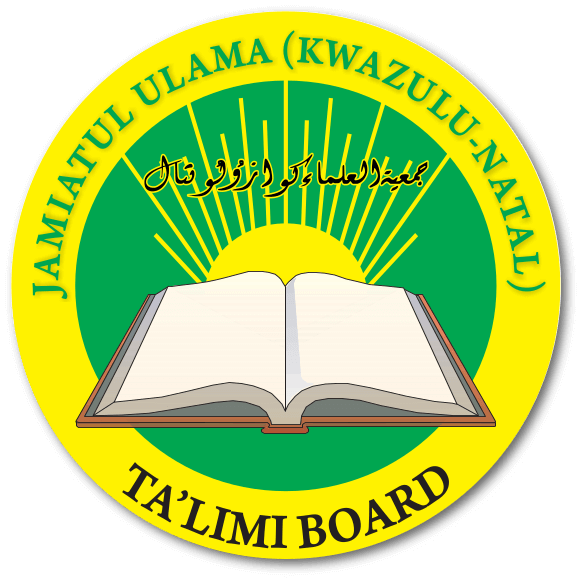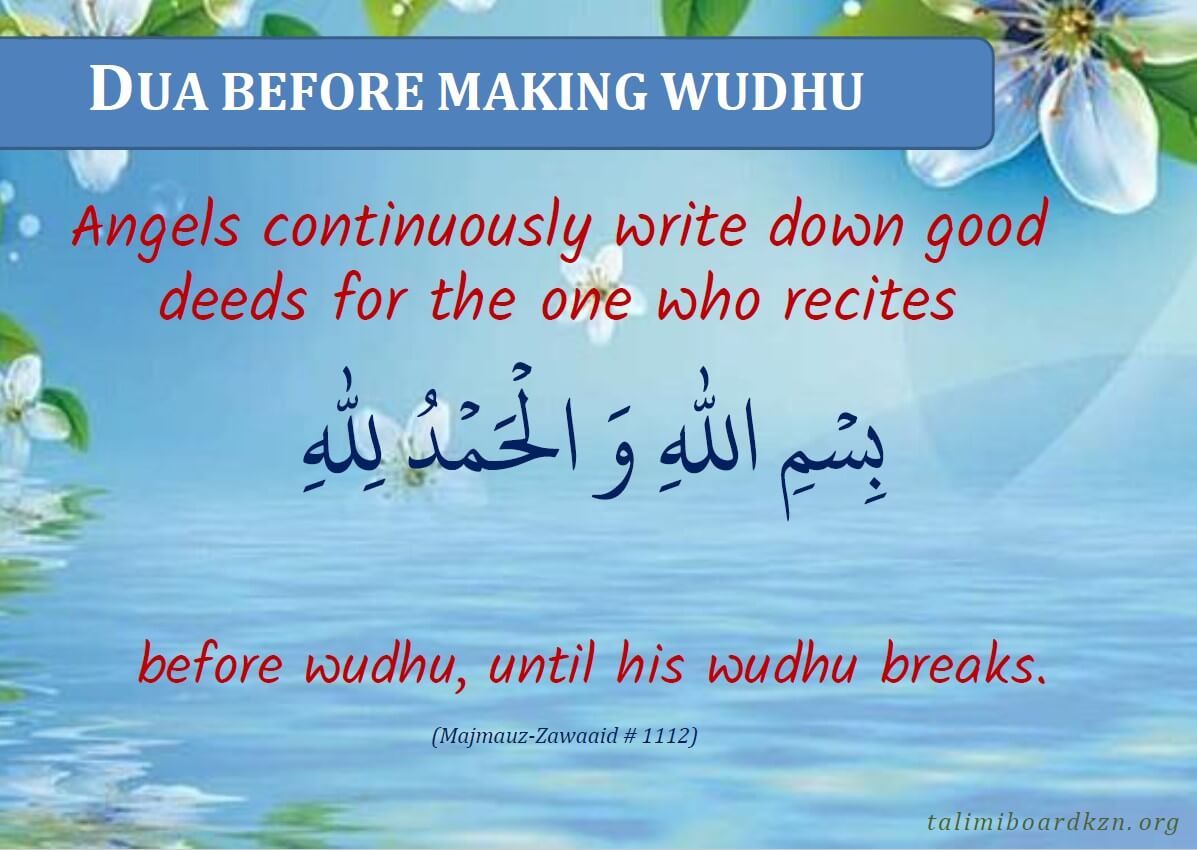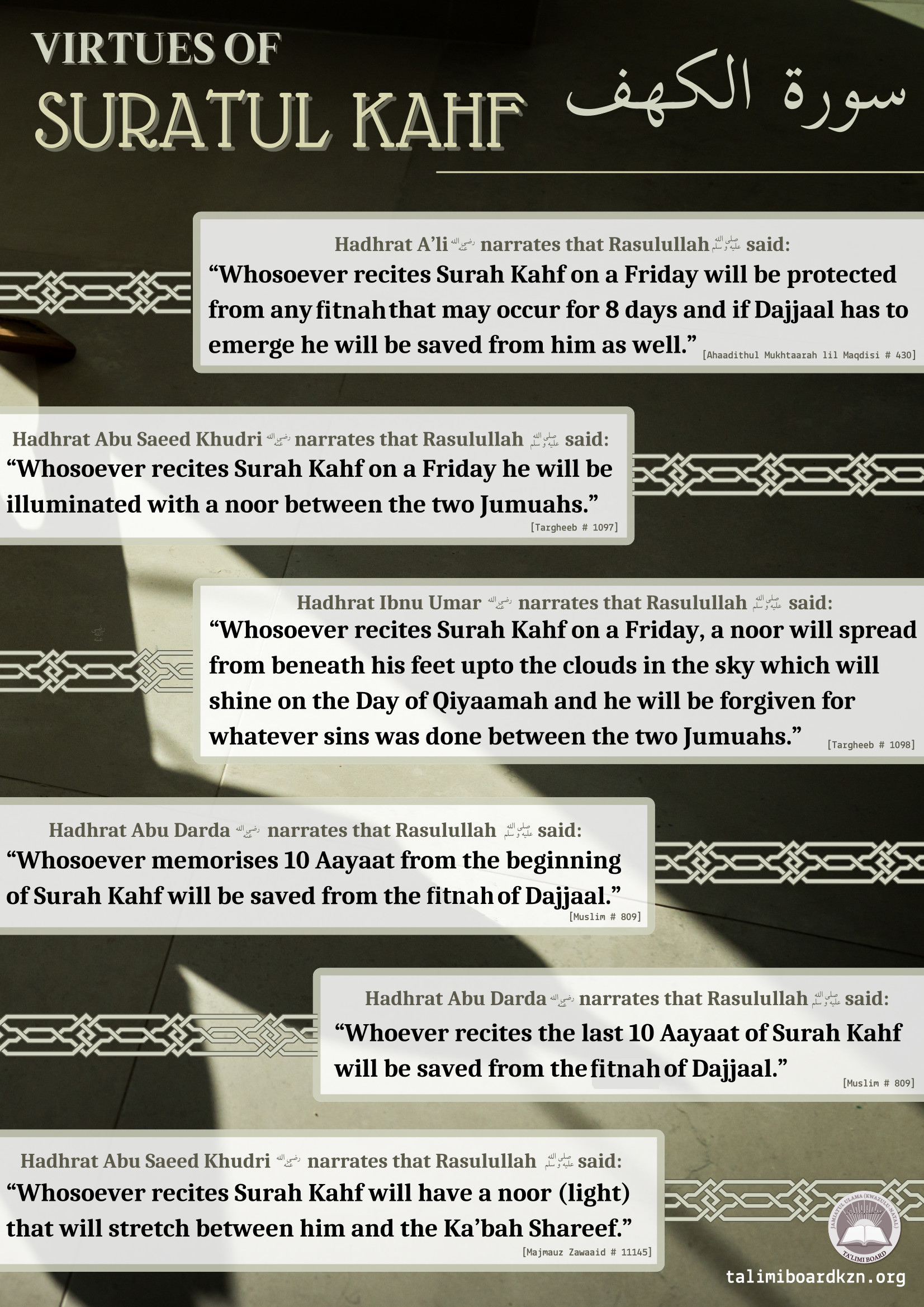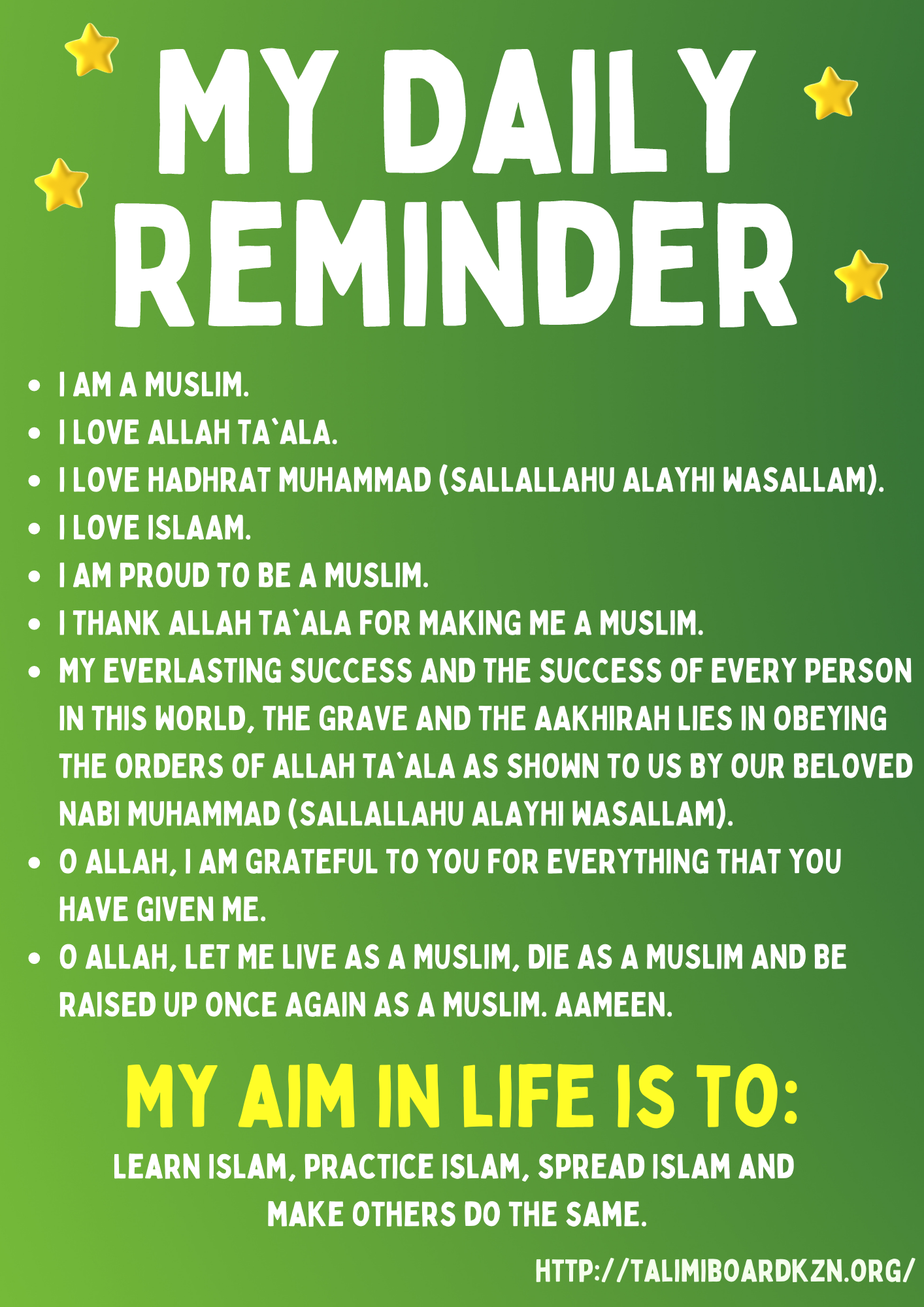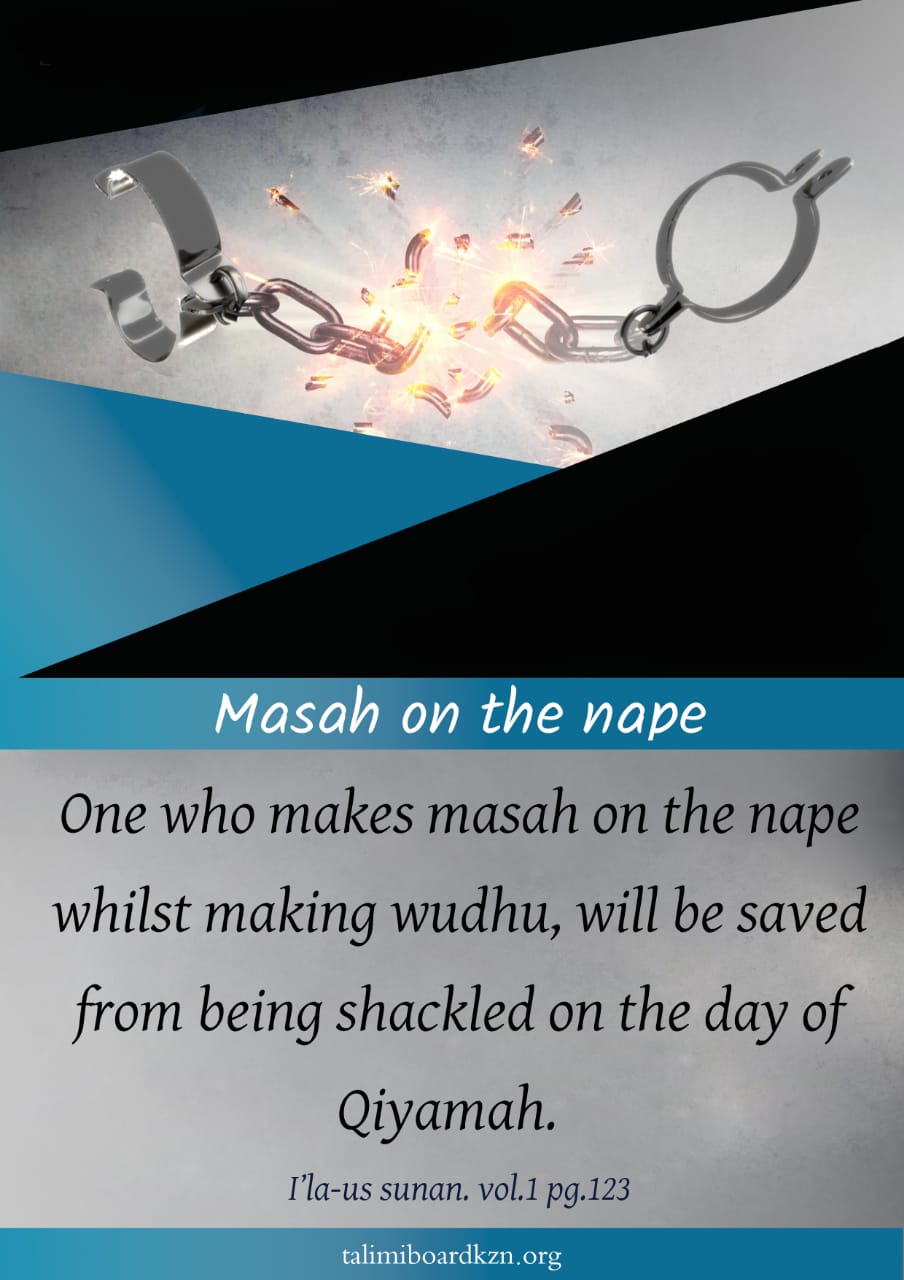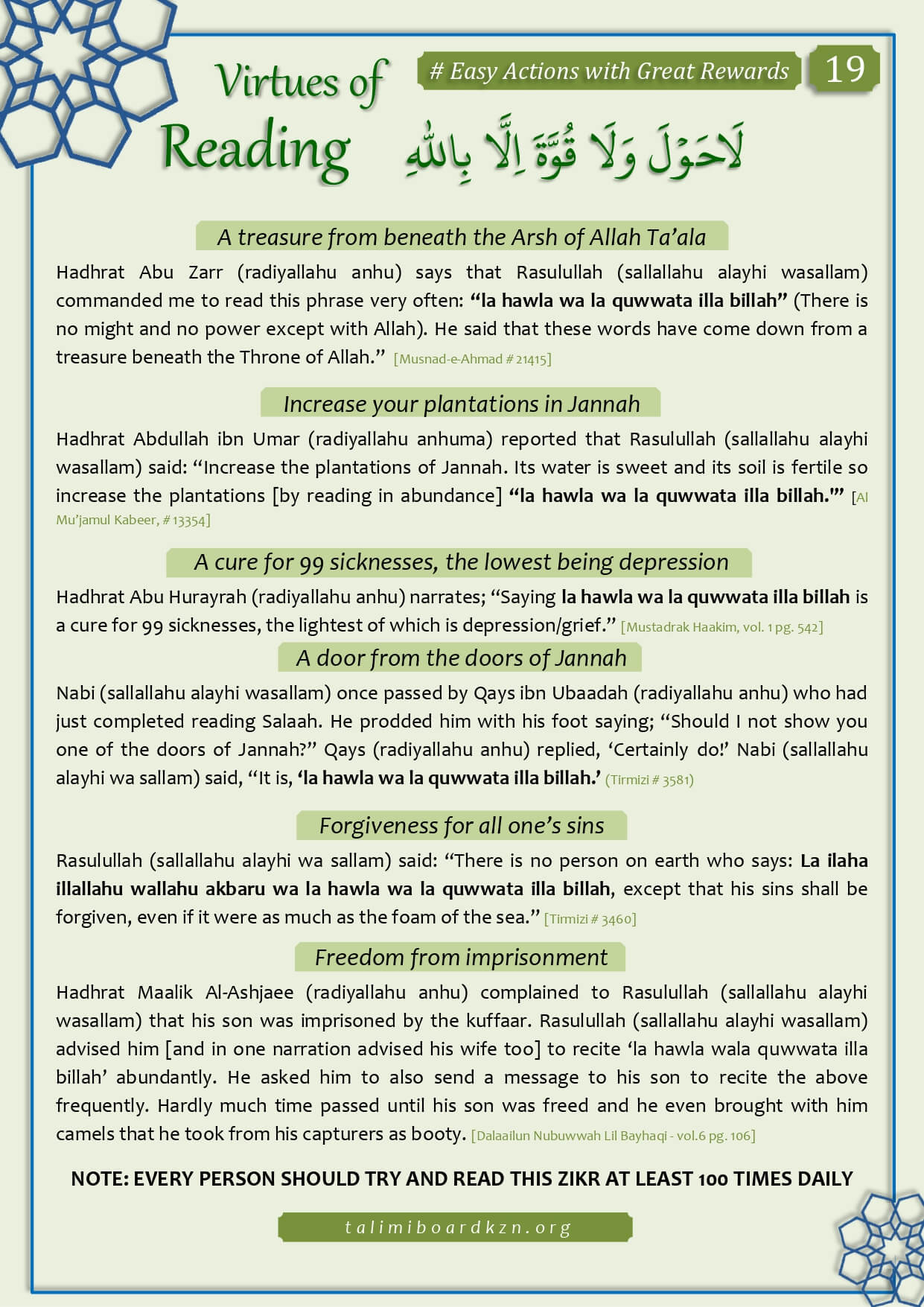
IMAAN – SUNNAT – TARBIYAT – AKHLAAQ – TA’LEEM – IBAADAT
| Notice Board |
(For mobile users, the website menu is the 3 Lines at the top below the Logo)
Ta’leem Planner per Term
Muhtaram Ulama / Mu’allimaat
Assalaamu alaykum wa rahmatullahi wa barakaatuhu
Please find attached Ta’leem Planner (1 X A4 back to back).Taleem Planner for the year
Please print a copy of this document and keep with your Prep Book. This form must be filled in at the beginning of each term and given to your principal or Supervisor to have it signed off.
As was discussed in the workshop on Saturday, once your principal signs off this form, you can prepare your weekly prep accordingly.
May Allah Ta’ala bless us and accept us for the khidmat of His Mubaarak Deen. Aameen.
Was Salaam
Syllabus Breakdown for 2026
Alhamdulillah by the grace of Allah Ta’ala our Madrasahs are opening today after a long holiday. Once again children will be coming to Madrasah to learn the Qur-aan Shareef by us. All praise is due to Allah Ta’ala alone for this. May Allah accept our broken efforts.
10 guidelines for the first day of Madrasah
- Perform two rakaats of Salaatul Haajah and make dua to Allah Ta’ala for assistance, guidance and acceptance.
- Get familiar with your classroom as well as the new children in your class.
- Write down the names of the pupils in the temporary register. [Attached]
- Give the children a small talk on the importance of coming to Madrasah everyday and how it will benefit them in this world and the next.
- Read out the guidelines for pupils. [This is found in the pupil’s diary].
- Give each child an enrolment form and ask them to have it filled in by their parents/guardians.
- Collect all pupils’ blue progress cards from the previous teacher. Erase assessments in Surahs, Duas and Hadith.
- Check if you have all the necessary kitaabs for your class. If you are short of any books, please make a note of it and contact your Principal / Supervisor. [Pls make a note of the changes in the Aqaaid and History syllabus]. This year we have new kitaabs in Aqaaid for Grades 1,2,3,4 and 5 and a new Kitaab for History Grade 7. [order form/new price list attached]
- Commence sabak of Qur-aan / Qaidah on the first day of Madrasah.
- Do revision of past years Surahs, Duas and Hadith in the form of a group before commencing with new work in these subjects.
We are currently in the month of Rajab and in a few weeks time we will Insha Allah be blessed with the mubaarak month of Ramadhaan. May Allah take us to Ramadhaan with ease and aafiyat. Humble request to all the teachers to please commence with the ta’leem of Fazaail-e-Ramadhaan daily in your classes to prepare our children spiritually for the mubaarak month of Raamdhaan.
Ta’limi Board (KZN)
Earlier Notices
Audio Streaming Link
This link is only active when a programme is in progress!
Posters
Important Audio Clips
100 Thousand Istighfaar by: Hadhrat Moulana Abdul Hamid (DB)
>>>Download Istighfaar Chart<<<
Importance of a maktab ustaads keeping in contact with the parents of the children.
Winding Up of Estates and
Drawing up an Islamic Will
Quick Links: Year Planner – Books – Kitaab Pricelist – Maktab Syllabus – Documents & Forms – Bank Details – Muzaakarah Workshop
| Advice & Articles |
Qualities of a Teacher – by: Hadhrat Moulana Yunus Patel Saahib (RA)
< […]
The importance of doing Home Ta’leem
Please find attached article by Hadhrat Mufti Ebrahim Salejee Saahib (DB)
Topic: The importance of doing Ta’leem daily at home
This topic cannot be overemphasized, especially in this holiday period when there are so many fitnahs around us, we should make a full out effort to do ta’leem diligently at home with our families. This is a means of grea […]
The Importance of Ta’leem at Home
Bismihi Ta’ala
A Muslim home is not a place where there are only frames with Aayats of the Qur-aan, Ahaadith or Arabic inscriptions on them or a Kalimah sticker on the front of the door or some taweez’s hung up here and there. A Muslim home is really a place in which 5 ti […]
| Imaani Muzaakarah |
In this Imaani Muzaakarah, the need is to keep on repeating. Repetition will Insha-Allah bring conviction.
Line 1: The first line is, “I will look after Allah’s commands and Allah will look after me and be with me.”
The child has to be convinced that protection lies in Allah’s commands. In Allah’s commands I will find Allah. I cannot afford to move away from Salaah, the Masjid, the Qur’aan and the Maktab in times of difficulty.
Line 2: The second line is, “If I need anything, I will ask Allah Alone, and turn to Allah Alone for help.”
At the time of need and help, I should be turning to and asking Allah. Today we are only turning to the means and asking the creation; completely forgetting our creator, Allah.
Line 3: The third line is, “The whole world cannot help me or hurt me, without the permission of Allah.”
This conviction has to settle deep in the heart, that every condition of benefit or harm, is only with Allah’s permission. Illness does not decide on its own who to go to and how to go. Allah is controlling and deciding.
Line 4: The fourth line is, “What’s not written for me, will never come to me. And what came to me, could never miss me.”
We believe in Taqdeer, Allah’s divine decision, perfect planning, having complete knowledge of everything. When we forget this, we end up questioning and blaming others. A man after adopting all the means, still falls sick, so he asks, “How come I fell sick?” In reality he completely forgot Allah. His question ought to have been, “How come I forgot Allah?”
What is desired from this Imaani Muzaakarah is that when anything happens, our minds and hearts should immediately turn to Allah.
Objectives of a Maktab
- To teach the correct Aqeedah (Beliefs of a Muslim).
- To teach the recitation of the Qur’aan Shareef with tajweed .
- To practically teach the manner of wudhu, ghusal, salaah, and other ibaadaat.
- To teach good manners and good character.
- To instil the love of Allah Ta’ala, Nabi Muhammad Sallallahu Alayhi Wasallam , and the Sunnah in the hearts of the students.
Download Poster
5 Pillars of Islam

